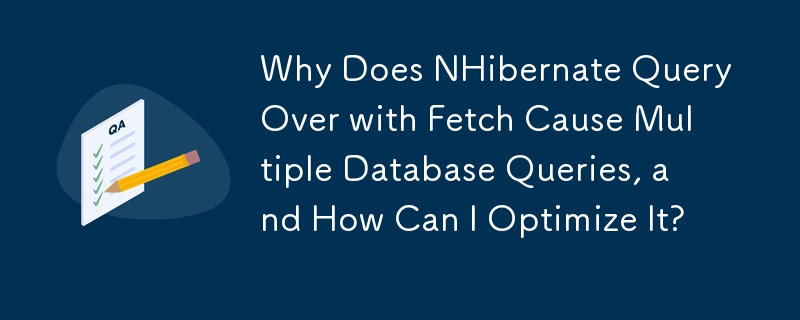Home >Database >Mysql Tutorial >Why Does NHibernate QueryOver with Fetch Cause Multiple Database Queries, and How Can I Optimize It?
Why Does NHibernate QueryOver with Fetch Cause Multiple Database Queries, and How Can I Optimize It?
- DDDOriginal
- 2025-01-04 12:04:35427browse

NHibernate QueryOver with Fetch Incurring Multiple Query Executions
Executing a QueryOver with a Fetch clause to retrieve a parent entity and its child collection often results in excessive database hits. This behavior occurs because NHibernate issues a separate query for each row in the child collection.
To understand this, consider a scenario with a UserRole entity and a UsersInRole collection. The first query retrieves the UserRole entities:
SELECT ... FROM UserRoles left outer join UsersInRoles on ...
For each UserRole retrieved, NHibernate then executes a separate query to fetch the UsersInRole collection, resulting in numerous queries in the format:
SELECT ... FROM UsersInRoles left outer join UserRoles on ... WHERE UserRoles.UserId=?
To optimize this behavior, NHibernate allows setting a BatchSize property on the HasManyToMany mapping:
HasManyToMany(x => x.UsersInRole) ... .BatchSize(25)
By specifying this option, NHibernate will load the child collection in batches, reducing the number of database queries to a maximum of 1 (batch-size / page-size). This ensures efficient retrieval of related data while avoiding excessive database hits.
The above is the detailed content of Why Does NHibernate QueryOver with Fetch Cause Multiple Database Queries, and How Can I Optimize It?. For more information, please follow other related articles on the PHP Chinese website!

